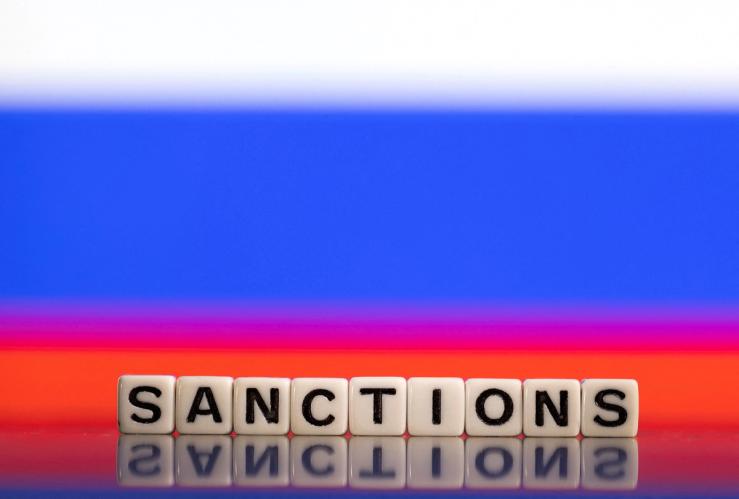The News
Western governments are trying to plug some of the leakiest holes in their sanctions against Russia.
American, European, and British officials have begun fanning out across the Middle East and Central Asia on a coordinated mission to stop the Kremlin from acquiring pieces of hardware like low-tech semiconductors and industrial components. Known as dual use items, many are found in everyday consumer goods some countries continue to sell freely to Russia, but which are also capable of fueling Vladimir Putin’s war machine.
The initiative, described by senior U.S. and European officials, is particularly focused on former Soviet states and international commercial hubs whose trade with Russia has surged since Moscow invaded Ukraine in February 2022.
American and European officials are concerned that these countries are re-exporting seemingly benign Western goods like washing machines to Russia, where their chips can be repurposed for military uses, including missile-guidance systems.
The European Union’s sanction czar, David O’Sullivan, said Western officials were planning visits or had already made trips to the United Arab Emirates, Turkey, Kyrgyzstan, Kazakhstan, Uzbekistan, Serbia, Armenia, and Georgia.
The diplomats are providing these countries with a specific list of dual-use products and materials that they should be banned from re-exporting to Russia. O’Sullivan declined to disclose the contents of the catalog, but said much of it focuses on ostensibly bland items like “integrated circuits” and “bits and pieces” of industrial components.
“It’s like Whac-a-Mole,” O’Sullivan, who spoke to reporters in Washington on Wednesday, said of enforcing sanctions. “This is a job that never ends.”
O’Sullivan said the task is delicate as many of these countries have deep trading relationships with Russia and haven’t formally signed on to the Western sanctions. But the Irish diplomat said their officials tell him they don’t want to be seen as aiding the Kremlin’s aggression in Ukraine.
The View From Washington
The Biden administration has focused its efforts specifically on the United Arab Emirates and Turkey, among others. The Treasury Department’s point man on illicit finance, Undersecretary Brian Nelson, has raised concerns with local leaders about how their trade with Russia, including U.S.-sanctioned entities, has ticked up.
As part of its persuasion campaign, the White House is also wielding threats of secondary sanctions, which target entities that do business with countries and companies the U.S. has blacklisted. In Turkey, Nelson warned local bankers that they risk losing access to the U.S. dollar and Western markets if they conduct certain Russian trade.
“In engaging with sanctioned Russian entities, Turkish businesses and banks could put themselves at risk of sanctions and a potential loss of access to G7 markets and correspondent relationships,” he said in Istanbul.
Last week, the State Department used these extraterritorial powers to sanction two Turkish shipping companies and two UAE investment firms for allegedly aiding Russia.
An Emirati governmental official declined to comment on Wednesday. But last month, the UAE’s central bank cancelled the license of Russia’s MTS Bank for what it said was the sanctions risk. Turkey recently cancelled the transit of sanctioned goods from Europe to Russia.
Jay’s view
Previous Western sanctions campaigns against pariah states that I’ve covered, particularly Iran and North Korea, didn’t succeed or fail based on moral arguments or convictions. Ultimately, countries and companies needed to know that they’d face serious financial pain if they did business with these rogue regimes. This is why the U.S. has increasingly framed the adherence to U.S. and allied sanctions as a simple choice for foreign bankers and businesspeople.
As Elizabeth Rosenberg, the Treasury Department’s assistant secretary for terrorist financing and financial crimes, put it at a conference last month: “You can do business with the countries that constitute more than 50% of the world’s GDP, and its most convertible and stable currencies, or do business with those who facilitate Russia’s war.”
This financial dominance has begun to cause some wariness among developing countries, many of which have been hesitant to join the U.S. and Europe’s financial war on Russia. It has recently inspired a spate of calls for the de-dollarization of the global economy. Last week, Brazilian President Luiz Inacio Lula da Silva urged the BRICS — Brazil, Russia, India, China, and South Africa — to develop their own currency and make themselves immune to Western sanctions.
The idea is unlikely to result in much; no financial system has emerged with the stability and depth to compete with America’s, and the reality is that Russian and Chinese money tends to seek safe havens in the West, not the other way around. But it speaks to the unease the global south feels about the might of the dollar.
The View From Brussels
O’Sullivan, who previously served as the EU’s ambassador to Washington, said Brussels is still building up its capacities to enforce sanctions and cut off the flow of Western technologies to the Kremlin. Brussels doesn’t have a secondary sanctions authority like the U.S., he said. Nor does it have the equivalent of the Treasury Department’s Office of Foreign Assets Control, which rigorously policies U.S. laws overseas.
“We don’t have the very impressive machinery of the U.S.,” he said.
Still, O’Sullivan said European leaders are considering the need for these capabilities as the EU increasingly employs its sanctions on foreign entities. The EU has enacted a string of sanctions on Iranian individuals and organization in recent months, for example, for supplying drone technologies to Russia and for engaging in human rights violations.
Room for Disagreement
Officials from some of the countries visited by U.S. and European officials have seriously downplayed the volume of sanctions violations, and said the impact of the re-exports are minimal. “Washing machines was one [thing] they flagged. And it turned out to be tiny number in the end,” one official told Semafor.
Notable
- European officials say their investigating media reports that Russia’s Wagner Group is laundering Sudanese gold revenues through the UAE.
- U.S. officials have voiced concerns about Kyrgyzstan’s role in aiding Russia.
- The American Institute for Economic Research says the process of de-dollarization has begun.


